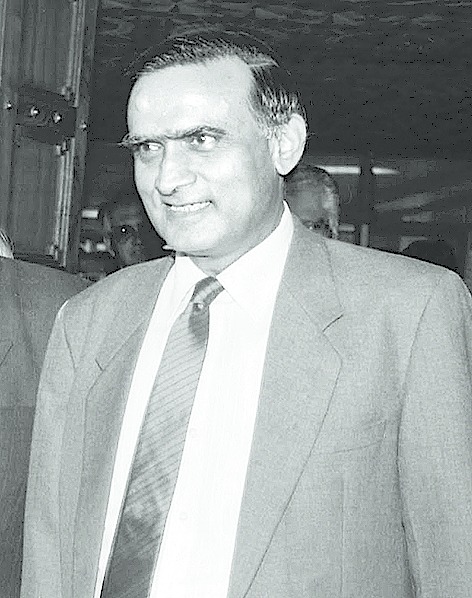
BUILDING A JUST WORLD: ESSAYS IN HONOUR OF MUCHKUND DUBEY Edited by Manoranjan Mohanty, Vinod C. Khanna and Biswajit Dhar, Orient BlackSwan, Rs 925
This is a good year for publications on the Indian Foreign Service. A biography on Subimal Dutt, India's third foreign secretary, is with a Delhi publisher, a memorial volume on A.P. Venkateswaran, the fourteenth foreign secretary has come out, and now there is this Festschrift for the sixteenth foreign secretary, Muchkund Dubey (picture).
Dubey is a leading diplomat turned academic turned institution-builder and policy formulator in the Council for Social Development. The book in his honour comprises 20 essays ranging from 7 to 30 pages of diverse quality, covering topics from international relations to economy to global issues, referencing Dubey's special interest in disarmament, world trade and development. The essays have coherence in that they generally reflect Dubey's world view for a just, fair and equitable world order and the central role of the State in providing national and international public goods. By far the most interesting parts of this volume are two candid interviews conducted by the three editors with Dubey in 2011 and 2012.
It is not clear when the various essays were written; some seem to date from 2010, some even earlier, and many suffer from being outdated. There is too much looking back at past iniquities and familiar woes in the international system (one contributor wryly refers to Proust's In Search of Lost Time) rather than proposing possible concrete solutions, the English is sometimes shaky and the index inadequate. Only a few chapters concede that not all developing countries voyage in the same boat; and neither do all OECD countries share the same agenda. The implicit white non-white binary is not helpful. Many of Dubey's views have just been endorsed by Jeremy Corbyn, who declared, "we don't have to be unequal, it does not have to be unfair, poverty isn't inevitable."
Boutros Boutros-Ghali in a foreword recites the well-known limitations of the United Nations, its "utter neglect" generated by the United States of America and its allies, and the unachievable remedies. The cause of poverty is regarded to be the result of "neo-liberal travesty" and unequal distribution of world income and wealth - Jagdish Bhagwati amusingly said "once you get caught by financial globalisation, to get free... is to send a letter resigning from the Mafia." But in every age, humans have felt they were in the epoch of maximum globalization. Globalization is nowadays an accustomed whipping boy, along with the International Monetary Fund and World Bank, but as one essay points out, globalization is "acknowledged to be having both a positive and negative impact... there are both winners and losers." The world order is indeed unjust, inequitable and unfair - but was it not ever thus? So indeed were recurring bouts of global economic instability, due to several different causes, even before the post-Cold War economic philosophy and the World Trade Organization. And it has always been the case that the most disadvantaged have borne the brunt of the burden.
Judging from more recent developments, BRICS and IBSA do not have the will or even the potential "to change the narrative at the international level." And it is most doubtful that they will have any incentive to formulate a new vision of international society when they have actually risen under the existing system. As one contributor cautiously points out, "how far China or India... Brazil or South Africa or even Russia are likely to invest... in balancing the world order itself remains the subject of further analysis." Despite the optimistic forecasts of some of the authors, Dubey himself asserts that India is not likely to rise "to be the third most powerful state" even if it becomes the third biggest economy; Japan and Canada were and are big and strong economies but do not aspire to power. He holds "grave doubts about the sustenance of the growth momentum in India... I do not feel very optimistic about the future of India... inter-personal inequality will widen and regional disparities will get accentuated."
Full credit to the co-editors in putting this Festschrift together and to Muchkund Dubey, its worthy recipient. Subimal Dutt would not concur with Dubey's high opinion of Indira Gandhi, nor A.P. Venkateswaran with the plaudits for Rajiv Gandhi, but Dubey's opinions on the world scene and about certain Indian dignitaries are no less valuable for all that.











